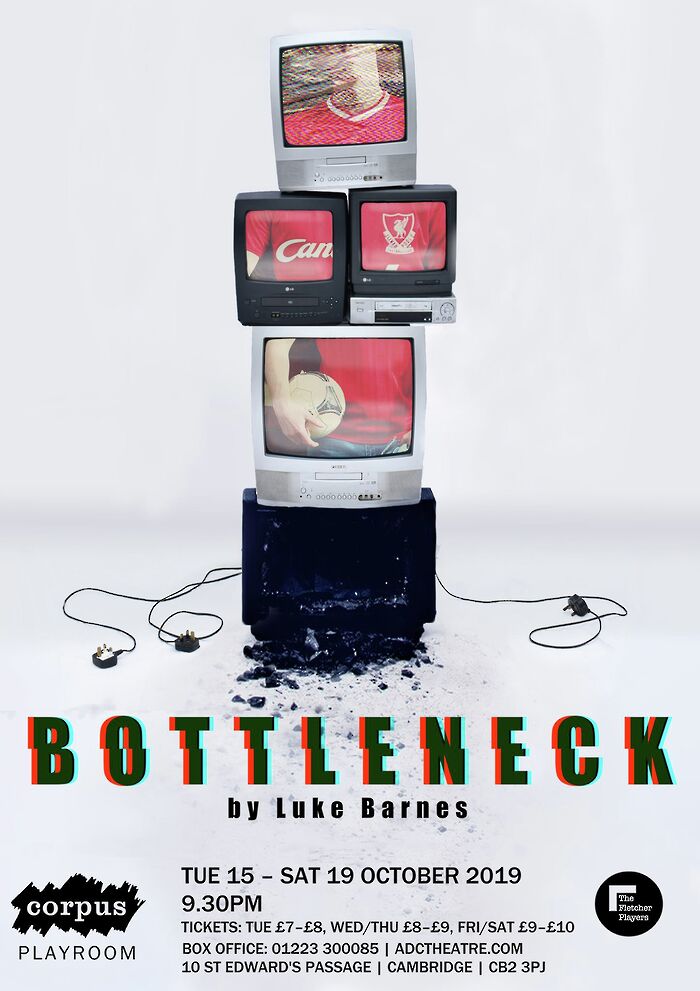Crouch, Touch, Pause, Engage is an emotive and effective tackling of trauma
Phoebe Rowell-John’s production sensitively handles its difficult subject matter, thanks to a strong ensemble cast and well-directed physical theatre.

Content note: this article contains discussion of poor mental health, domestic abuse
Crouch, Touch, Pause, Engage is a powerful piece of verbatim theatre which follows the story of Welsh rugby hero, Gareth Thomas, as he struggles to come to terms with his sexuality. Despite tackling (forgive the pun) harrowing themes, the play is not without several moments of humour, which offer much-appreciated respite from the sober plotline. This five-person show uses highly effective physical theatre and stylised techniques to tell of Thomas’ rise to rugby glory, while being hounded by press speculation and battling with suffering mental health. Interwoven with this narrative are the accounts of Meryl and Darcey, two teenage-girls growing up in Thomas’ hometown of Bridgend. Like Thomas, they too struggle with mental health crises, at times shocking the audience with quite how distressingly graphic their stories become; indeed, a clearer content warning attached to show publicity material might have been advisable.
This second storyline is particularly hard-hitting and at times detracts from the more nuanced story of Gareth Thomas’ experiences. The connection between the two halves of the plot, which are brought together in one of the play’s final scenes, also feels somewhat tenuous. However, this is no fault of the cast or crew and both direction and performance are outstanding throughout. Very much an ensemble piece, it is difficult to single out particular actors; Harriet Wilton and Freya Ingram give highly emotive performances as Darcey and Meryl respectively, while Georgina Deri and Brandon Lino as Vonnie and Baz are the epitome of proud parents. Benjamin Gibson makes a memorable best-friend as Compo, and gives a sinister twist to the newspaper reporter, Jason. All five cast members play Gareth Thomas by turn and all offer convincing, sympathetic performances. The excellent welsh accents maintained throughout also deserve mention.
“Both direction and performance are outstanding throughout”
Multi-roling can often pose a challenge, and this is one of the few points which might perhaps have been handled more effectively. The use of a red rugby shirt to indicate which actor was playing Thomas was mostly successful, although the rapid character changes did prove confusing for the first twenty minutes. Another more minor issue was in the nature of these symbolic costume changes, which meant a lot of time spent manoeuvring in and out of jumpers to the slight distraction of the audience. In all other respects, however, Phoebe Rowell-John’s direction was superb. Never before could I have imagined a five-person rugby match staged at the Corpus Playroom, yet the show’s use of physical theatre was truly outstanding. The training sequence in the play’s final scene was especially successful and it was in ensemble scenes such as this that the direction really came into its own.
The staging of Meryl’s childhood experiences of domestic abuse was particularly memorable; her father’s abuse was spoken by the other four cast members who stood, half-lit, bracing themselves on the walls of the theatre. The effect was highly disturbing and gives a good example of how the play achieved the intensity it was so successful in creating. Deasil Waltho’s tech design was crucial in this regard, complementing the stylised performance on stage with flashing lights, cleverly-timed blackouts and rugby commentary. Set and costume, although minimalist, were highly effective and I particularly enjoyed the use of lockers and benches to create sets as diverse as club changing rooms and Welsh cliff tops.
A memorable show and one well worth seeing, Crouch, Touch, Pause, Engage offers an intense, highly dramatic exploration of some very difficult themes. It stands-out from other student theatre tackling sexuality and mental health by virtue of its highly talented ensemble cast and innovative use of physical theatre.
 News / Cambridge student numbers fall amid nationwide decline14 April 2025
News / Cambridge student numbers fall amid nationwide decline14 April 2025 Lifestyle / First year, take two: returning after intermission14 April 2025
Lifestyle / First year, take two: returning after intermission14 April 2025 News / First candidate to announce chancellorship bid pledges to tackle bullying 12 April 2025
News / First candidate to announce chancellorship bid pledges to tackle bullying 12 April 2025 News / Uni to ‘review’ tripos rankings and weekend lectures in undergrad teaching overhaul10 April 2025
News / Uni to ‘review’ tripos rankings and weekend lectures in undergrad teaching overhaul10 April 2025 Sport / Cambridge celebrate clean sweep at Boat Race 202514 April 2025
Sport / Cambridge celebrate clean sweep at Boat Race 202514 April 2025




